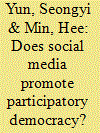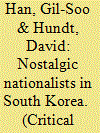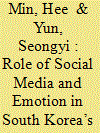| Srl | Item |
| 1 |
ID:
175527


|
|
|
|
|
| Summary/Abstract |
This study examines whether social media contributed to the success of the Korean presidential impeachment protests of 2016–17 and promoted participatory democracy. The 2016–17 candlelight protests contributed to the overthrowing of a corrupt regime. However, was it a victory of participatory democracy? To answer this question, we must first be clear on what kind of participatory democracy is being referred to. Therefore, while social media played a crucial role in the success of the protests, the impact of social media on participatory democracy should be addressed separately. For this purpose, we first analyse the contributions of the digitally connected movements during the 2016–17 protests with two social movement theories: resource mobilisation and collective identity. Second, we examine whether the success of digitally connective movements during those protests promoted participatory democracy. To discuss this issue, we use Arnstein’s concept of a ‘ladder of participation’, which describes participatory democracy as falling within three levels, from non-participation through tokenism to citizen power. This study shows that the proliferation of social media politics by itself does not convert representative democracy into participatory democracy. This implies that even if social media augments citizens’ power of resistance, it cannot transform citizens into a governing power.
|
|
|
|
|
|
|
|
|
|
|
|
|
|
|
|
| 2 |
ID:
181036


|
|
|
|
|
| Summary/Abstract |
The 2016–2017 Candlelight Revolution was one of the most significant events in recent South Korean politics, but little attention has been paid to the powerful conservative counter-movement that accompanied and followed the candlelight protests. This counter-movement was symbolized by demonstrations by flag-carriers who found Park Geun-Hye’s impeachment and Moon Jae-In’s inauguration incomprehensible. They argued that Park was innocent, called for her release from prison, and claimed that Moon’s election was illegitimate. An analysis of speeches made during conservative counter-protests between 2016 and 2019 illustrates how these activists reject the values of a new era in South Korean political and economic life. Instead, their speeches conveyed a clear desire to have the legacy of the industrialization generation recognized in contemporary South Korea. These flag-carriers are evidence that a marginalized set of desires and aspirations about South Korean nationalism and identity coexist with the progressive views of the candlelight protesters. The persistence of such an intense and partisan worldview, however, poses a threat to the future of liberal democracy in South Korea.
|
|
|
|
|
|
|
|
|
|
|
|
|
|
|
|
| 3 |
ID:
164805


|
|
|
|
|
| Summary/Abstract |
Previous studies have shown that social media is effective in large-scale mobilization, facilitating leaderless and more flexible forms of resistance. However, some scholars argue that this type of mobilization suffers from a lack of organizational form and collective identity. This paper shows that social media-centered networks can in fact promote collective actions powerful enough to challenge a corrupt president. We also prove the role of emotions in collective actions. Using an empirical analysis of the 2016 Presidential Impeachment Protests surrounding “Choi Soon-sil Gate,” we first demonstrate the effects of social media activities on participation in collective actions. Next, we explore the effects of anger on social media activities and participation. In short, this study reveals a new angle on social media’s influence in mobilizing collective actions by analyzing the effect of emotions on participation. In this process, social media activities are escalated by emotional outbreaks, and participation then increases throughout a given collective action.
|
|
|
|
|
|
|
|
|
|
|
|
|
|
|
|